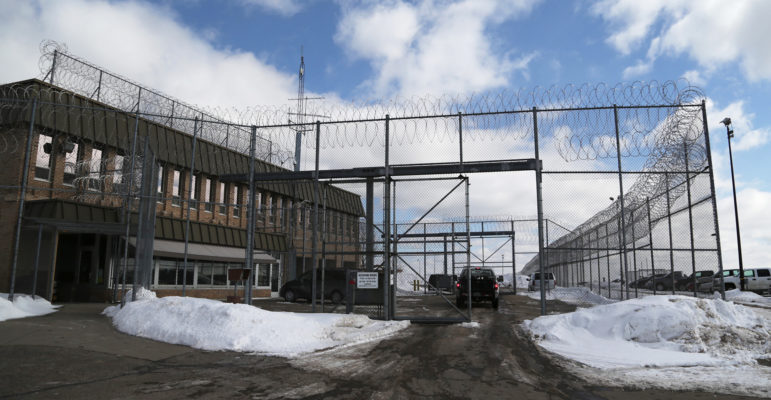A Debate Over Lincoln Hills Problems
Critics of trauma-informed care say it led to problems, others say it wasn’t fully implemented.

Students change classes in a hallway at Lincoln Hills School for Boys in 2013. Beginning in 2012, staff at Lincoln Hills and Copper Lake School for girls were trained in and began using trauma-informed care principles. Photo by Dan Young of the USA TODAY NETWORK-Wisconsin.
A new approach being championed by the state of Wisconsin is being blamed by a union official for breakdowns in security at Wisconsin’s two juvenile prisons that are now the targets of criminal and civil rights investigations.
Beginning in 2012, staff at the Lincoln Hills School for Boys and Copper Lake School for girls were trained in and began using trauma-informed care principles. A 2014 report by the Division of Juvenile Corrections summarizing use of the approach credits it with a sharp reduction in disciplinary referrals.
Department of Corrections spokesman Tristan Cook said trauma-informed care now is the “standard approach” to juvenile corrections in several states, including Wisconsin.

Union representative Troy Bauch says officials at Lincoln Hills School for Boys ‘gave the keys away to the kids’ when they implemented trauma-informed care at the northern Wisconsin juvenile prison. Photo courtesy of AFSCME Council 32.
But Troy Bauch, a union official who represents workers at the two facilities, said he believes the introduction of trauma-informed care led to the alleged abuse now under investigation. And, Bauch said, the new approach has led to offender-on-staff attacks.
The allegations under investigation — that offenders have been attacked and sexually abused by staff and other offenders — prompted the resignation of DOC Secretary Ed Wall and the departure of staff and top management at the two prisons. The facilities also have been plagued by suicide attempts in recent months.
“The facility gave the keys away to the kids,” said Bauch of the American Federation of State County and Municipal Employees Council 32. “There came a time where they (DOC) stopped holding youth accountable for their behavior. That led to assaults on staff and other youth.”
“I think it’s not fair to blame the trauma-informed care approach,” responded Joanne Juhnke, policy director at Wisconsin Family Ties, a Madison-based mental health advocacy group that helped train staff at the two facilities in Irma. “The trauma-informed care approach … is the opposite of the allegations of abuse. Trauma-informed care is all about safety.”
Cook agreed, saying the department has no plans to abandon trauma-informed care.
“It would be inaccurate to suggest that trauma-informed care was responsible for a breakdown in security and order, as trauma-informed care is a philosophical approach that takes into account prior trauma or abuse and teaches youth to avoid harmful or destructive behavior,” Cook said.
Fewer restraints used
The 2014 report recounted several security and other changes made to avoid traumatizing or retraumatizing the young people held there. The majority of the offenders had experienced at least three “adverse childhood experiences,” including physical or sexual abuse or severe and persistent neglect, the report said.

A security fence surrounds the entrance to the Lincoln Hills School for Boys and Copper Lake School for girls complex in rural Irma, seen in this file photo. The two schools are under federal investigation for alleged abuse and violations of the civil rights of juvenile inmates housed there. Photo by Dan Young of the USA TODAY NETWORK-Wisconsin.
The changes included eliminating the use of leg shackles, with limited exceptions related to “aggression containment.” The facilities also stopped placing restraints on young offenders for out-of-building appointments such as doctor or dentist visits if they were not in “restraint status” while in the institutions because of escape risk. According to Bauch, workers also were told they could not summon security personnel to classrooms except for assaults or other serious incidents.
The report compared two living units at Lincoln Hills — one that incorporated trauma-informed care in juvenile offenders’ daily lives and another that did not.

Razor wire tops one of the fences at the Lincoln Hills School for Boys and Copper Lake School for girls complex in rural Irma, Wis. Federal criminal and civil rights investigations probing allegations of abuse of juvenile offenders are underway at the facilities. Photo by Dan Young of the USA TODAY NETWORK-Wisconsin.
Among the strategies used in the trauma-informed unit was creation of a “calm room” that was used an average of 266 times per month, and policies that led to fewer room confinements and other disciplinary actions. Walls were repainted with more relaxing colors and window screens that had created a “cage-like atmosphere” were removed. The number of major disciplinary infractions in the trauma-informed unit was cut in half, the report found.
But the report said some employees doubted the approach and had trouble using trauma-informed care in their interactions with the offenders.
Bauch countered that he believes the more relaxed atmosphere led to offender-on-offender assaults and attacks on staff, including one employee whom he said suffered a traumatic brain injury.
“The reason kids are at Lincoln Hills is they’ve been through everything else the state of Wisconsin has to offer, and they’ve failed … in less-restrictive environments,” Bauch said.
“Trauma-informed care — when they brought that in, they saw the beginning of the end of a safe facility.”
Supporters tout approach

Scott Webb is the trauma-informed care coordinator for the Wisconsin Department of Health Services. Webb says he does not know what role trauma-informed care played in the allegations of abuse under investigation at Lincoln Hills School for Boys. Photo by Coburn Dukehart of the Wisconsin Center for Investigative Journalism.
Scott Webb, coordinator of trauma-informed care for the state Department of Health Services, said he does not know what happened at Lincoln Hills and Copper Lake. He said trauma-informed care, when used correctly, should reduce — not exacerbate — violence.
“These young people, most likely, come from very traumatic backgrounds, and perhaps it’s never really been identified, it’s never really been talked about,” Webb said. “These young people may not have ever made the connection between their behavior and where maybe they have come from. And trauma-informed care doesn’t excuse behavior, but it may explain a lot of it.”
Tamra Oman, an advocate who helped train the Lincoln Hills and Copper Lake staff, said trauma-informed care only works when everyone, both staff and offenders, feels safe.
“That literally is the number one thing with trauma-informed care: Safety, transparency and honesty,” said Oman, who was physically and sexually abused as a child. “We have to get it stable and safe, whatever that looks like, wherever you are.
“If we continue to retrigger and hurt people,” Oman added, “no one is going to win.”
Reporting for this story was supported by the Solutions Journalism Network and the Center on Media, Crime and Justice. The nonprofit Wisconsin Center for Investigative Journalism (www.WisconsinWatch.org) collaborates with Wisconsin Public Radio, Wisconsin Public Television, other news media and the University of Wisconsin-Madison School of Journalism and Mass Communication. All works created, published, posted or disseminated by the Center do not necessarily reflect the views or opinions of UW-Madison or any of its affiliates.
More about the Lincoln Hills and Copper Lake Facilities
- Evers’ Prison Plan Receives Mixed Reviews - WPR Staff - Feb 21st, 2025
- ‘First of its Kind in Wisconsin’ Collaboration Will Support Disabled Incarcerated Youth - Andrew Kennard - Dec 12th, 2024
- MKE County: Tight Budget Forces Difficult Vote on Housing, Juvenile Justice - Graham Kilmer - Nov 1st, 2024
- Letters from Evers, Republicans Show Clash on Juvenile Corrections - Andrew Kennard - Aug 17th, 2024
- Following Counselor Death, Staff, Family Plead for Help At Lincoln Hills - Andrew Kennard - Aug 16th, 2024
- Lawmakers Grill Wisconsin Prison Officials Over Safety, Employee Death at Youth Facility - Sarah Lehr - Aug 7th, 2024
- Future of Lincoln Hills Remains In Limbo - Isiah Holmes - Apr 12th, 2024
- MKE County: County Youth In State Prisons Declining Again - Graham Kilmer - Jan 15th, 2024
- Legislative Committee Okays $6 Million for 2nd Juvenile Facility - Devin Blake - Oct 1st, 2023
- Some Progress, Still Problems at Lincoln Hills - Isiah Holmes - Jul 9th, 2023
Read more about Lincoln Hills and Copper Lake Facilities here






















